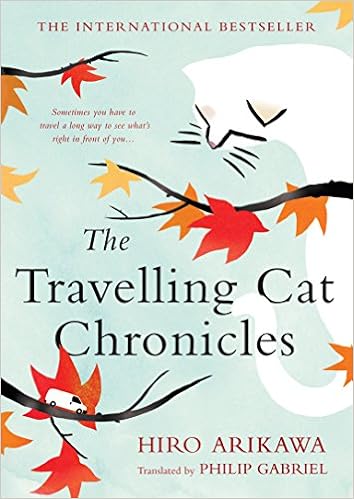I’m more a dog person than a cat person, but my husband and I had cats in the past, so I picked up this book because I was looking for something different to read.
Satoru, a man in his thirties, rescues an injured stray cat which he names
Nana. They live together happily for
five years. Then they set out on trips
across Japan to visit friends because Satoru is looking to rehome Nana; “’unavoidable
circumstances’ were preventing him from keeping [his precious cat] any longer.” Nana wants to stay with Satoru and sets out
to sabotage the visits so Satoru has to keep him.
Much of the story is narrated in the first person by Nana, but there is
also a third person narrator who gives the backstory of Satoru’s growing up and
how he came to become friends with the people they visit.
Satoru’s character is developed through his interactions with people
and Nana. He comes across as a truly
good person – kind and loving towards animals and humans. Despite hardships, he doesn’t wallow in
self-pity and tries to be optimistic.
Nana’s character is also developed.
He is a proud cat who sees himself as “a rare, wise cat” and “a
high-spirited, adventurous cat that will never be intimidated.” What differentiates him is that he is a cat
capable of loyalty and gratitude, the perfect cat for a good man like
Satoru. Of course, it is Nana’s
observations about humans and the world that stand out. For instance, “Humans always underestimate
our language skills. Just ‘cause they
can read and write, there’s no need to act all high and mighty.” Anyone who has ever had a cat will recognize
the truth in comments on feline behaviour:
“Cats the world over prefer to discover things they like on their own
and rarely go for anything that’s been provided for them.”
In some ways, the book is a self-improvement book offering advice on
how to live. For example, Kosuke, the
first friend they visit, learns that it is important to be independent from one’s
parents. Another man’s “sense of inferiority and jealousy
diminish” after Satoru and Nana’s visit.
Optimism is emphasized: “it would
be better to keep a smile on your face till the end. And then I’m sure you’ll be happier.”
The novel is an easy read. There
is little mystery as to why Satoru is looking for a new home for Nana; however,
though there is sadness, the overall tone is optimistic. We are encouraged to think of life as a
journey during which we can “see all
kinds of amazing things. Let’s spend our
time taking in as many wonderful sights as we can.”

No comments:
Post a Comment